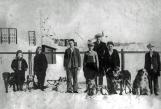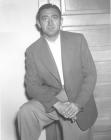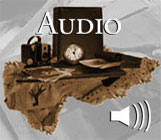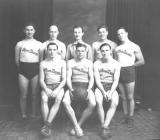1
Kirkland Lake grew from a small gold mining camp into a thriving community in 20 years. The population of the town started at less than a thousand and by 1939 reached a zenith of 24,000 people.Over the same period, the community's Jewish population grew substantially. From Mr. Kaplan and Mrs. Brown, the local Jewry expanded to approximately 125 families by the eve of World War II.
2
Besides shopkeepers and other entrepreneurs, the Jewish community included a number of professionals including lawyers, doctors, and dentists.4
The town lawyer, Mr. Harry Moscoe, he was a really fine man. He raised a family, there were about four children, in Kirkland Lake. He left here at a time when he felt it was time to take his children to the city. Things were getting slower in town as far as I know and he also had lived here and had been a criminal lawyer and defended cases in court, but pulled out I guess in his late forties and went to Toronto where his children did very well. Uh, some of the children had been back here on business and uh, I don't remember his wife's name, his wife was very active in Hadassah, sisterhood, you know, they were a regular, but they were also unlike many of the early Jewish pioneers here. Harry was a boy who had been born in Toronto. He didn't have a European background. He spoke English, you know, like a college professor.6
And uh we had another dentist that was in town for a while, a Dr. Roodman. He practiced in Kirkland Lake in the thirties and left in wartime, you know, things were getting tougher. And uh, I can't remember his first name. He was also, he loved, he loved to play poker. He was a gambler and had a circle of friends. And he and his, his wife was with him and they were very active in the Jewish community and they took an active part. Uh he did not do too much praying or coming to the synagogue to pray but his wife was very active with the Jewish women.And uh we had another dentist, I think I had mentioned earlier when we started this thing, we had a Dr. Teich. And he was the first, probably one of the first dentists in Kirkland Lake. And uh he practiced, he was still practicing when I came to Kirkland Lake. When I, when I was still in public school I lost, he did come back for one of the reunions, I saw him again many years later he came back to Kirkland Lake on a visit. I know he went back to the States. And uh he still had a fond spot for Kirkland Lake but I don't know, I don't know exactly what happened, what became of him. He must be gone by now. He was practicing here in the thirties. And uh he also liked to gamble and shoot pool. And liked women. And he was always the, was always the announcer at the wrestling matches and the boxing matches. He didn't use a, he didn't use a P.A. system. He just opened his mouth and let her go.
7
Spring Dog Derby (AN 2001.25.1)1930
Central Public School, Kirkland Lake, Ontario, Canada
 Credits:
Credits:Museum of Northern History Collection
8
6 children with dog and Dr. Joseph Teich. They are posing in front of Central Public School and the Townsite Mine in Kirkland Lake, Ontario. The children have gathered for the annual Spring Dog Derby organized by the Kiwanis Club.10
The Sam Davis Basketball Team, probably in the fifties. There was a basketball league in town and the reason the picture is here, there are two Jewish members of the team. The man in the rear left is Dr. Harry Magder and he practiced medicine here for about ten years till he married a Bukovetsky girl, a lady by the name of Bukovetsky who came here from Timmins. Her father owned Bukovetsky's Store, the big department store in Timmins. She had graduated from university and her first, first teaching job was in Kirkland Lake and Harry of course was a single man at the time and met her and married her and they went off to England where he went back to school and became an ophthalmologist. And he died just a couple of years ago in Montreal. He was then the head of the ophthalmology department at the Montreal General.Now the man on the right hand side, on the other end of the line opposite him is Issie Gold and he was the window dresser, he was the window dresser at the time in the, in the uh, Sam Davis store.
12
B. Scheaffer There were no Jews who did not close.J. Atkins: At that time, in small communities everywhere, our most holiest days of the year, those people who had Jew businesses or Jew owned business, generally closed their stores, ok, and that was Rosh HaShanah and Yom Kippur, the day of atonement and those are the most important days.
B. Scheaffer Apart from . . . the main storekeepers in town were primarily men's wear, ladies' wear, jewellery . . . the theatre business was family owned. Do you remember anybody else, remember Mr. Brown was the shoemaker. . .
F. Scheaffer: Mr. Jacks the furrier.
B. Scheaffer: The furrier, but basically it was ladies' and men's' wear was it not Joe?
J. Atkins:Ya
B. Scheaffer But we did have professionals also. We had dentists, Dr Roodman - we had doctors, Dr. Montagnice.
J. Atkins:Henry Montagnice was no doctor.
B. Scheaffer: He vaccinated me?
J. Atkins: Henry Montagnice sold equipment for the theatres.
B. Scheaffer: Oh, then who was it, there was other doctor, oh there was somebody else. There was a Jewish doctor . . .yes
J. Atkins: Doctor Magder
B. Scheaffer: Magder not Montagnice - Oh I'm sorry I am wrong, Thank you for correcting me there. My father always used to say that when the Jewish professionals moved out that was beginning of the dying of the town.


